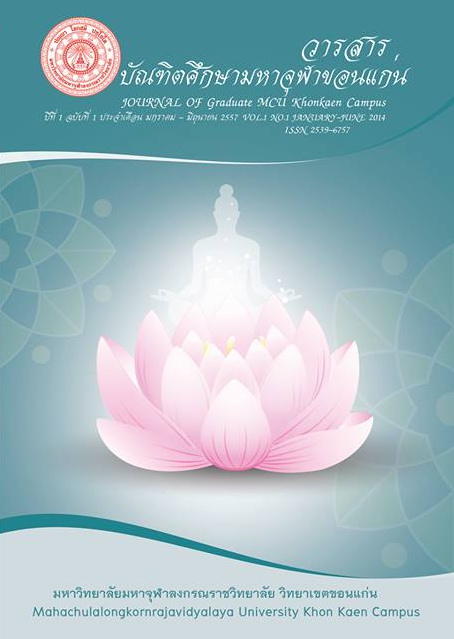An Analytical Study of Axiology As Manifested in Lyrics of The Bodyslam Artists
Main Article Content
Abstract
An analytical study of the axiology as manifested in lyrics of the Bodyslam artists was the new frontier for the Buddhist field and yet no one had attempted to study. This research was processed with collecting all data from the Lanka President's papers, books, text sources and the interview of scholars and the three experts in three branches of knowledge: philosophy, language, and music including the singers of Bodyslam. The collected data was analyzed and created in the realm of new knowledge. This research covered three purposes: (1) to study the meaning and the history of axiology, (2) to study the history and the concept of songs sung by the singers in Bodyslam, and (3) to analyze axiology in the sings sung by the singers of the Bodyslam.
The results of the study were found that axiology was the philosophy to search the ethical values and aesthetic values of music coming from the audience’s clear understanding. It was really deeply conscious of the aesthetical taste of the music that was higher than general sense of joyfulness. The aesthetical value basically came from each audience’s aesthetical experience.
Singers of Bodyslam were the Rock Band that got the highest vote from the public of Thailand. A survey by Suan Dusit poll was found that Bodyslam got the highest vote for five years until the present time. It also had interesting songs containing the content of ideas about vivid experience. These aspects came from reasonable analysis made by the song writer who added his ideas and experience in his created songs. As a result, the songs and the singers in Bodyslam were most popular in the present time over all areas of Thailand.
Moreover, axiology in the songs of the Bodyslam gave the Pali literary tastes such as the taste of Ayoga. This Pali taste was love between a man and a woman who had never seen each other but they wanted to meet each other by various ways in order to show their love, clearly seen in the song. In the ethics about that person’s good experience and conduct, there was the description of Itthanasa—the sympathetic taste that came from losing the wanted things. To get happy from the experienced things and helping the other people was the main condition to sacrifice oneself to the social service that brought about great benefits for one’s life and the others. However, both values of axiology and aesthetics were seen in their songs for ever.
Article Details
References
ฉบับราชบัณฑิตยสถาน. (2548). พจนานุกรมศัพท์ปรัชญาอังกฤษ-ไทย (พิมพ์ครั้งที่ 4).
กรุงเทพมหานคร : โรงพิมพ์ศักดิโสภาการพิมพ์.
ชื่อเพลง : ความเชื่อ ศิลปินบอดี้สแลม อัลบั้ม Believe. (2548) ออนนไลน์, แหล่งที่มา :
https://xn--72c9bva0i.meemodel.comนื้อเพลง/ความเชื่อ_บอดี้สแลม
มหาจุฬาลงกรณราชวิทยาลัย. (2539). พระไตรปิฎก ภาษาไทย ฉบับมหาจุฬาลงกรณราช
วิทยาลัย.กรุงเทพมหานคร: โรงพิมพ์มหาจุฬาลงกรณราชวิทยาลัย.
สุกรี เจริญสุข. (2535) สรุปคําบรรยายวิชาสุนรียศาสตร์ทางดนตรี. อัดสําเนา. สถาบันวิจัย
ภาษาและวัฒนธรรมเพื่อพัฒนาชนบท มหาวิทยาลัยมหิดล.

